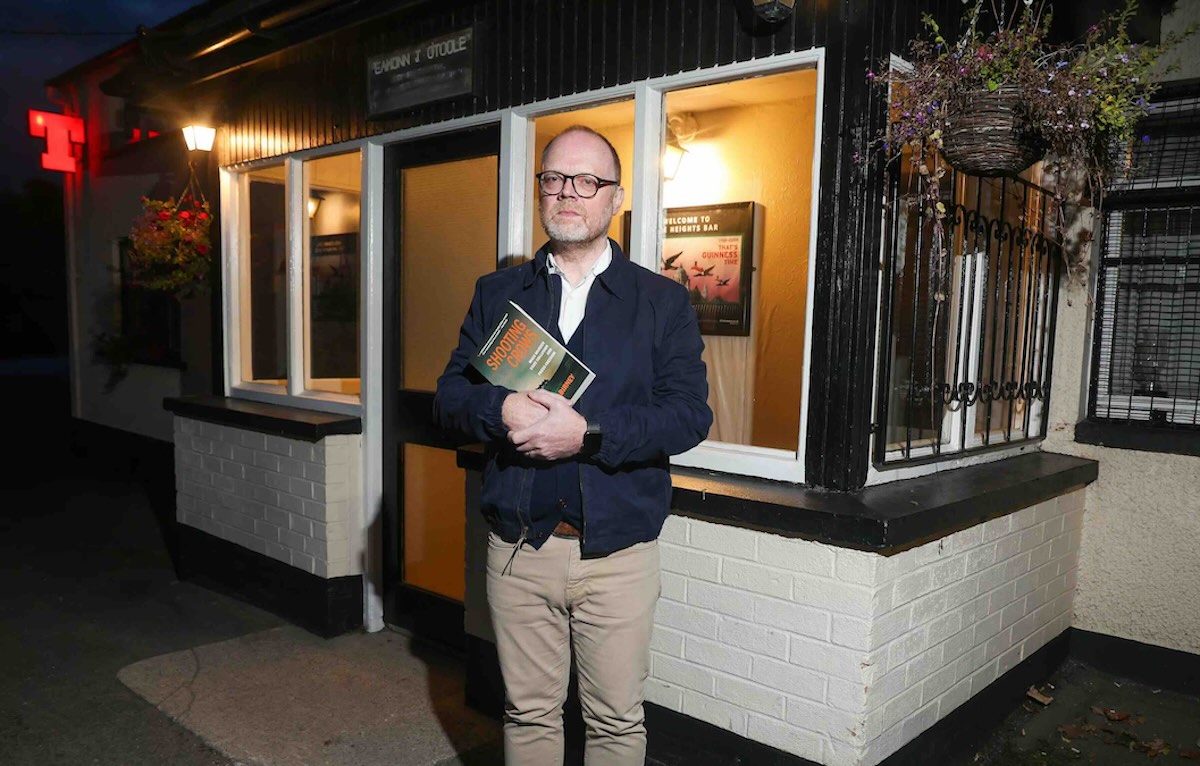
A South Down member of a loyalist murder squad, suspected of a sectarian killing in Belfast more than 30 years ago, is believed to have been recruited as a Crown informer a year before the same gang carried out the infamous Loughinisland massacre.
Martin Lavery was shot dead in front of three of his children at his home on the Crumlin Road in December 1992.
It later emerged that a gun used in the attack was recovered by the RUC after the murders of six men in the Heights Bar in Loughinisland in June 1994.
That atrocity saw UVF gunmen burst into the Heights Bar in the village and murder six men watching Ireland play Italy in the World Cup finals, horrifying and terrifying nationalists at a critical time in the peace process.
It is now believed that the member of the south Down UVF unit who killed Martin Lavery was in the pay of the British Crown Forces when it carried out the Loughinisland massacre.
Details are revealed in a new book, ‘Shooting Crows, Mass Murder, State Collusion and Press Freedom’, by journalist and film maker Trevor Birney.
The book reveals the extent of Crown Force collusion with loyalists and efforts by the RUC/PSNI police to target journalists investigating collusion.
In August 2018, Birney and fellow journalist Barry McCaffrey were arrested by the PSNI investigating the leak of confidential documents about the Loughinisland massacre.
The 2017 documentary ‘No Stone Unturned’, produced by Birney, featured documents leaked to McCaffrey, that proved officers in the force knew the identities of the killers.
But the PSNI didn’t go after the killers - instead Birney was shocked when the home he shares with his wife, Sheila, and their three daughters, was raided, before detaining him.
It’s a scene vividly recounted in his book, and which he recalled in an interview this week with Mick Heaney of the Irish Times.
“Honestly I never thought in my wildest dreams – or nightmares – that the PSNI would decide that the moral compass after the film pointed in the direction of journalists and leaks,” he said.
As to why he was arrested – the case was eventually dismissed – Birney suspects police officers past and present pressured PSNI leaders into the investigation. But he feels there were other factors at play too.
“I think the PSNI wanted to send a chill factor into the journalistic community in the North, to say if you’re going to go after legacy issues, then this is what you can expect to happen to you,” he said.
(The title Shooting Crows refers to the comments of the judge granting the warrant to raid Birney’s home, who worried that it was an exercise in scaring off others.)
“I fear that there are hundreds, if not thousands, of stories that are buried in the files of the PSNI and will never be told. And I think that there’s a policy of keeping that door locked and sealed off from relatives.”
Mr Birney’s new book is the culmination of a decade of delving into the Loughinisland killings.
With forensic detail, Shooting Crows recounts the background to the terrible, as well as revealing the labyrinthine connections between the killers and their intelligence handlers. Some of the material is familiar from the ‘No Stone Unturned’ film, which named a local UVF member as the main gunman and revealed that his wife later informed his identity to the police. Neither were ever charged.
But there are shocking new revelations, notably that prior to Birney’s arrest 24 years later, PSNI members visited the man named as the main gunman to ascertain whether he had been upset by the film.
The whole experience has left its mark on Birney’s family.
“It changed our lives. I can see it in the faces of my daughters,” he says. “Their attitude to the North and life in Belfast has suffered, because I think what it did was force them to take a side. It was like that moment where they felt they had to stand up.”
Mr Birney highlights that by the summer of 1993 police had a picture of the south Down UVF unit’s make up and activities.
The author added that “despite having all this crucial information and an intelligence source within the murder gang, police….took the decision that the killers should be allowed to remain free to kill”.
The book also reveals that the PSNI spied on a senior official in the office of the Police Ombudsman, the body which investigates PSNI actions.
The former press officer at the watchdog was placed under 24-hour surveillance for two weeks in 2018 after the arrest of Mr Birney and his colleague Barry McCaffrey.
Mr Birney explained that police had pursued communications data belonging to the journalists prior to their arrest, and had wrongly concluded that a press officer at the ombudsman’s office had been the source of the leaks,
“When we were arrested, the ombudsman’s chief press officer was put under twenty-four-hour surveillance for two weeks,” he said.
The police also came to the conclusion that after they were released from Musgrave Street barracks, they would go straight to see the press officer and he would hand over more documents.
Mr Birney dismisses the police theory as “laughable”.
“They clearly had no understanding of how leaks occur; furthermore, in my experience, the last person in the world who would decide to leak secret documents is a press officer.”
* Shooting Crows by Trevor Birney is published by Merrion Press
![[Irish Republican News]](https://republican-news.org/graphics/title_gifs/rn.gif)
![[Irish Republican News]](https://republican-news.org/graphics/title_gifs/harp.gif)

